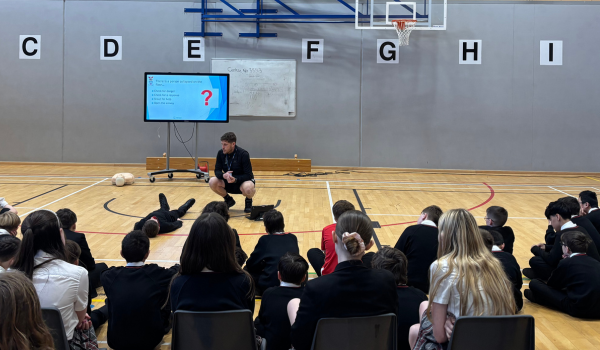
Training Irlam High School pupils to save a life
Date: Monday, 31 March 2025. -
Blog
defibshop and Imperative Training have been supporting the local community in empowering the younger generation with the skills needed to respond to Sudden Cardiac Arrest.
Teaming up with Irlam and Cadishead Academy, defibshop provided manikins and training defibrillators to the school so that teachers can offer sessions to their students on responding to an emergency, Cardiopulmonary Resuscitation (CPR) and using an Automated External Defibrillator (AED).
We sat in on one of these sessions to see the response from pupils, with Head of PE Gary Prescott delivering the lesson to a Year 7 group. Mr Prescott began the session with a presentation on cardiac arrest including key statistics.
The importance of young people having this knowledge is clear - with over 85,000 Out of Hospital Cardiac Arrests (OHCA) each year - and less than 1 in 10 people who suffer an OHCA surviving. Around 80% of these cardiac arrests take place at home, and in an emergency such as cardiac arrest where every second counts, young people knowing how to recognise the signs and act accordingly is key.
Mr Prescott told the pupils: “It could be your parents, grandparents or anyone else at home, but those first steps you take could save their life. This kind of first aid is not compulsory in the curriculum yet but we are lucky enough to be able to deliver this session today with the help of defibshop.”
Before getting some hands-on experience with defibshop’s training AEDs, the pupils observed a short demonstration by Mr Prescott on a volunteer, where he acted out an unconscious casualty to talk through the DR ABC survey that must be carried out in this scenario. 999 should be called when a casualty doesn’t respond, before the rest of the steps are taken.

DR ABC stands for Danger, Response, Airway, Breathing, Circulation.
Danger - Ensure that attempting to intervene does not place you or the casualty at risk of further harm. For example, live electricity or road traffic would present possible dangers.
Response - Check for a response from the casualty, you can do this by shaking their shoulders gently and loudly asking “Are you okay?”.
Airway - Make sure the casualty’s airway is clear by placing two fingers under their chin and one hand on their forehead and gently tilt their head back.
Breathing - Check for breathing by placing your ear next to their mouth and look down across their chest. You are checking for breath against the side of your face or seeing their chest rise and fall.
Circulation - Check for signs of circulation, such as a pulse, and if necessary, start CPR.
Pupils were then allowed to practice their AED skills and CPR using training defibrillators and manikins provided by defibshop / Imperative Training.
About defibshop and Imperative Training
Since 2003, Imperative Training has been striving to ensure that everyone has the skills and confidence needed to save a life in a medical emergency - this extends to the younger generation and schoolchildren. defibshop has been working for almost two decades to supply businesses and individuals across the UK with life-saving defibrillators.
